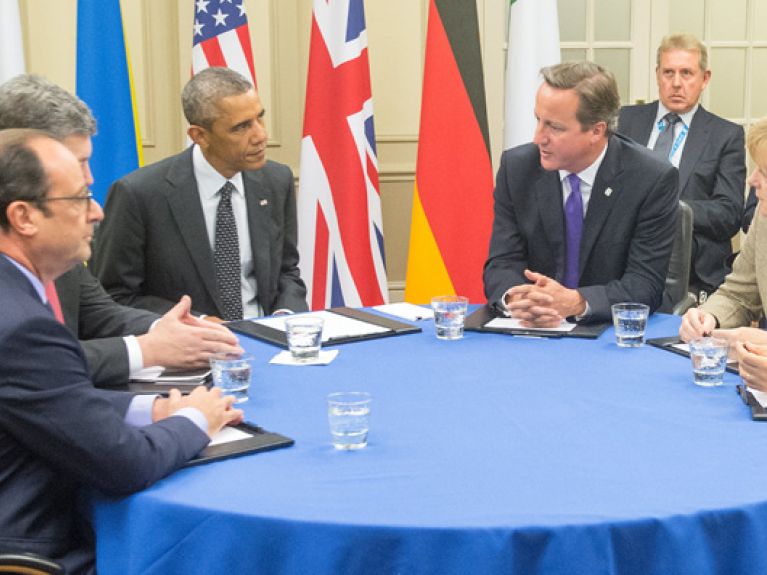NATO faces new challenges
NATO faces a change of direction. This became especially clear at the summit in Wales.

When describing its summits, NATO is quick to use terms such as “historic” or “milestone”. Although only history will tell whether the NATO summit in Wales at the beginning of September 2014 merits such descriptions, it was important nonetheless. Its significance rose for two main reasons. It was the first meeting of NATO heads of state and government since Moscow violated international law with its annexation of Crimea and the warlike conditions began in east Ukraine. While some optimists initially believed the Ukraine crisis would only represent a bad weather front in relations with Russia, today unanimity exists within the alliance that it is a case of fundamental climate change. Russia is positioning itself against NATO and the European Union and is prepared to change frontiers in Europe by force in order to realise its superpower dreams. This represented a sea change for the Atlantic alliance and called for a clear message of determination to Moscow. At the same time, and this was a special German concern, the lines of communication to Russia must remain open.
That’s why the heads of state and government agreed a balanced catalogue of military measures under the heading of a Readiness Action Plan – also to convey a feeling of alliance solidarity to the member states in the eastern part of the NATO area. The plan envisages a new rapid response force that can be mobilised within a few days in the event of a crisis on NATO’s external borders. The details of the military response capability of this “spearhead” unit, such as numbers of soldiers and lines of command, will be worked out in the coming months. In addition, navy patrols in the Baltic Sea, monitoring flights in the Baltic region, the stationing of troops in the eastern part of the NATO area and frequent military manoeuvres are to guarantee the security of alliance territory. The fact that Germany will participate in these measures on a substantial scale also represents a new challenge for the Bundeswehr, the German armed forces.
Three aspects of NATO’s reaction to Russia’s expansion course are significant. First, the decisions were reached in great unanimity, something that should not be taken for granted in an alliance in which the member states’ security interests vary considerably according to their geography and history. While Italy and Spain, for example, look more towards the continent’s southern crisis centres, today Poland and Estonia emphasise that their warnings about Russia have not been taken seriously in the past. Second, what are involved are framework decisions that need to be honed in the immediate future. That means they can be strengthened or weakened depending on how Moscow proceeds. Third, the measures relate only to the security of the NATO alliance area – there are no thoughts of a military defence of Ukraine. Therefore, and Federal Chancellor Angela Merkel has made this clear, there will be no deliveries of arms to Ukraine. The Wales summit is also special for another reason: namely, the fact that this meeting initiated a change of direction within NATO that goes far beyond the Russia-Ukraine crisis. There is consensus among its members that NATO must not degenerate into a purely European-Atlantic defence alliance, but should also continue to keep its eyes on crises and conflicts outside Europe as well as questions of collective security. However, it is unclear how this role as a global security actor will be played in the future.
This is illustrated by developments in the Near and Middle East. Here, for many years, NATO has cooperated with around a dozen, mainly Moslem countries, helped in training armed forces and outlined the role of the military in democratic societies. In addition to this, NATO engaged in direct crisis management by, for example, intervening militarily in Libya in 2011 and preventing atrocities by the Gaddafi regime against its own population.
Both forms of engagement – cooperation with states and intervention in humanitarian disasters – are likely to become much harder in the future. The collapse of Iraq, the fall of Libya, the disintegration of Syria, the establishment of caliphates and the permanent crisis in Egypt are signs of an ongoing erosion of statehood. If states and governments collapse, the partners with which NATO can cooperate successfully also disappear. Interventions are also becoming increasingly unlikely even when they are imperative in the face of dramatic human rights violations. The example of Libya demonstrated that even a successful military intervention does not automatically give rise to a new order in the region. It should therefore come as no surprise that intervention weariness is growing in all NATO countries in the face of such outcomes.
Wales was an important NATO summit because concrete decisions were reached especially with regard to the future stance towards Russia. In addition, it constitutes the starting point for a fundamental change in the tasks and goals of the North Atlantic alliance. It will be very difficult to keep this open-ended process within the normal cycle of summits that are held as a rule every two years.
This is all the more so because it is currently almost impossible to predict Moscow’s goals or developments in Asia, the Middle East and North Africa. As so often in its 65-year history, NATO once again faces considerable adjustments. There is a lot of work for Jens Stoltenberg, NATO’s new Norwegian Secretary General. ▪
Dr Karl-Heinz Kamp is a knowledgeable NATO expert and the Academic Director of the Federal Academy for Security Policy in Berlin.

